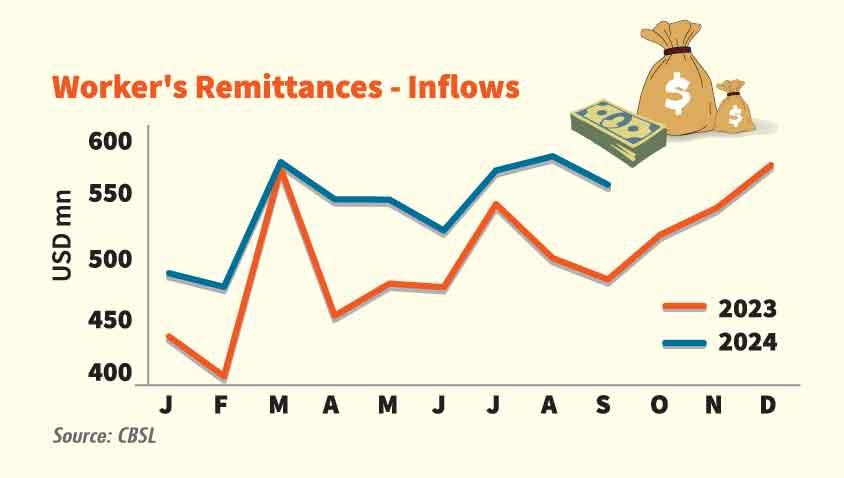Reply To:
Name - Reply Comment

The moneys from Sri Lankans working abroad continued to flow in quite robustly in September albeit some softening seen from a month ago, with a potential to bring the full year inflows by the year end at a striking distance from their former levels seen in normal times.
Sri Lankans working abroad sent back a robust US$ 555.6 million in September 2024, up 15.2 percent from the levels seen in the same month a year ago.
However, this was a negligible slowdown from the US$ 577.5 million received a month ago in August 2024, which wasn’t at all a thing to be concerned about, as there could always be some volatility between months.
And Sri Lanka is again entering into its year end festive season which usually brings in higher than average inflows from the migrant Sri Lankans.
The September inflows meanwhile brought the cumulative nine months inflows to US$ 4,843.8 million, up 11.5 percent from the same period in 2023.
In a normal year, Sri Lanka used to receive US$ 7.0 billion from those working abroad.
Despite largely a people’s favourite government coming into power at the Presidential election held on September 21, there are still a large number of Sri Lankans who want to leave the country seeking better jobs and greener pastures.
Economy remains still much smaller than it was before the pandemic, depriving jobs for hundreds of thousands of people. And the prolonged shortages of essentials, and the hyperinflationary conditions in 2022 and most of 2023 forced many of them to flee those deplorable economic conditions at home. Despite months-long softer inflation readings which flipped into deflation in September cannot undo multifold increase in prices of everything people buy as the inflation is a measure of change in prices within a period of 12 months.
Some attribute the inflation what Sri Lanka went through to higher demand conditions, meaning people have eaten much more than they used to, and others link it to supply chain bottlenecks caused by both the pandemic and the Ukraine war.
What exacerbated Sri Lanka’s situation was the currency depreciation.
During the worst of the pandemic, many of those who were in the Middle East and elsewhere wanted to come back home, and the government at the time facilitated their arrivals in even chartered flights as they felt safer at home than remaining with their foreign employers.
Now that the opposite is taking place, Sri Lanka should be receiving higher income from remittances than a few years ago and they must also be feeling a lot more confidence in repatriating their moneys back home as Sri Lankans gave a resounding mandate last month to a new government which ran its entire campaign to root out corruption.